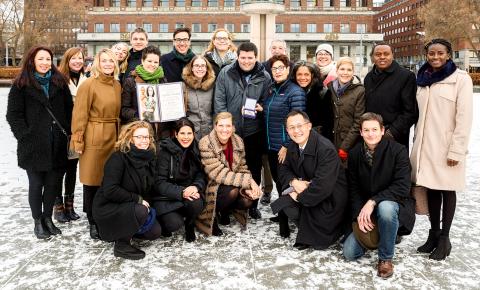Akira Kawasaki will give a lecture in Taipei on Dec. 8 called Nurturing Changemakers: Peace Education in a Globalized Era.
Kawasaki, an International Steering Group member of Nobel Prize-winning organization International Campaign to Abolish Nuclear Weapons (ICAN) and an Executive Committee member of Peace Boat, will discuss ways to increase participatory learning to combat discrimination throughout the globe.
The lecture, which is part of the Lung Yingtai Cultural Foundation (龍應台文化基金會) Taipei Salon (台北沙龍) lecture series, will be moderated by Shaw May-Yi (邵梅儀), Assistant Professor of Humanities Education, The Hong Kong University of Science and Technology.

Photo courtesy of ICAN
Kawasaki’s talk will examine how advances in technologies have led to the rapid spread of discrimination and hatred — and even nuclear weapons pose once again an existential risk to humanity. When peace is threatened, he says, peace education becomes critical. How do we nurture change-makers who can take concrete actions toward peace?
As a member of ICAN, Kawasaki has devoted years to the abolition of nuclear weapons. The civil society coalition has helped bring about the Treaty on the Prohibition of Nuclear Weapons, which was adopted by the United Nations in 2017. Since 2008, Kawasaki has coordinated the “Global Voyage for a Nuclear-Free World: Peace Boat’s Hibakusha Project,” in which atomic bomb survivors travel the world to share their stories.
Drawing on his extensive experience, Kawasaki will discuss the importance of first-hand participatory learning as a means to understand the consequences of global conflicts and disasters in diverse regions.
■ Taiwan Academy of Banking and Finance (台灣金融研訓院), 2F, 62 Roosevelt Rd Sec 3, Taipei City (台北市羅斯福路三段62號2樓)
■ Sunday Dec 8 from 2pm to 3:30pm; free admission, but those wanting to attend must pre-register at www.civictaipei.org/registration.php (English and Chinese). For more information, call Tiffany Jan (02) 3322-4907, Ext. 12. The lecture will be held in English.

June 23 to June 29 After capturing the walled city of Hsinchu on June 22, 1895, the Japanese hoped to quickly push south and seize control of Taiwan’s entire west coast — but their advance was stalled for more than a month. Not only did local Hakka fighters continue to cause them headaches, resistance forces even attempted to retake the city three times. “We had planned to occupy Anping (Tainan) and Takao (Kaohsiung) as soon as possible, but ever since we took Hsinchu, nearby bandits proclaiming to be ‘righteous people’ (義民) have been destroying train tracks and electrical cables, and gathering in villages

Dr. Y. Tony Yang, Associate Dean of Health Policy and Population Science at George Washington University, argued last week in a piece for the Taipei Times about former president Ma Ying-jeou (馬英九) leading a student delegation to the People’s Republic of China (PRC) that, “The real question is not whether Ma’s visit helps or hurts Taiwan — it is why Taiwan lacks a sophisticated, multi-track approach to one of the most complex geopolitical relationships in the world” (“Ma’s Visit, DPP’s Blind Spot,” June 18, page 8). Yang contends that the Democratic Progressive Party (DPP) has a blind spot: “By treating any

Swooping low over the banks of a Nile River tributary, an aid flight run by retired American military officers released a stream of food-stuffed sacks over a town emptied by fighting in South Sudan, a country wracked by conflict. Last week’s air drop was the latest in a controversial development — private contracting firms led by former US intelligence officers and military veterans delivering aid to some of the world’s deadliest conflict zones, in operations organized with governments that are combatants in the conflicts. The moves are roiling the global aid community, which warns of a more militarized, politicized and profit-seeking trend

This year will go down in the history books. Taiwan faces enormous turmoil and uncertainty in the coming months. Which political parties are in a good position to handle big changes? All of the main parties are beset with challenges. Taking stock, this column examined the Taiwan People’s Party (TPP) (“Huang Kuo-chang’s choking the life out of the TPP,” May 28, page 12), the Democratic Progressive Party (DPP) (“Challenges amid choppy waters for the DPP,” June 14, page 12) and the Chinese Nationalist Party (KMT) (“KMT struggles to seize opportunities as ‘interesting times’ loom,” June 20, page 11). Times like these can